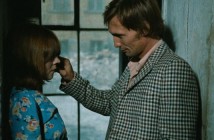
Hunt for the Wilderpeople
Hunt for the Wilderpeople: Taika Waititi’s (What We Do in the Shadows, Eagle v. Shark, Flight of the Conchords) adaptation of Barry Crump’s 1986 novel, “Wild Pork and Watercress,” Hunt for the Wilderpeople fits – maybe too neatly – the definition of “crowd pleaser.” From its cheer-worthy underdogs against the world plot to the badly misunderstood, but kindhearted foster kid, Ricky Baker (Julian Dennison), down to one last chance before the Powers-That-Be send him to a juvenile detention center until he becomes a legal adult, to the same foster kid’s love of American hip-hop (he even names his dog Tupac), and the prickly, curmudgeonly survivalist, Uncle Hec (Sam Neill) who grudgingly becomes Ricky’s protector, mentor, and friend over the course of the film’s running time, to the broad, slapstick comedy and verbal humor (injected at regular intervals to keep audiences fully engaged in the protagonist’s plight), Hunt for the Wilderpeople never strays from the “crowd-pleaser” formula. To some, possibly many, that’s a net positive. For others, though, it’s playing it safe with potentially compelling material (e.g., cross-generational relationships, the foster care system, cultural appropriation and assimilation, among others). Hunt for the Wilderpeople doesn’t have to be a tome or treatise on any one of those subjects, of course, but its over-reliance on feel-good moments, cheap laughs (fat kid humor early on) suggests Waititi had little interest except to make anything except competently made, ultimately disposable entertainment, the kind moviegoers will thoroughly, if superficially enjoy, from moment to moment, but also the kind they’ll forget moments after the end credits roll and the screen grows dark.

Maggie’s Plan
Maggie’s Plan: Like Woody Allen and Noah Baumbach before her, Rebecca Miller (The Private Lives of Pippa Lee, The Ballad of Jack and Rose) knows New Yorkers, albeit New Yorkers of a certain hue and a certain socio-economic strata (i.e., relatively wealthy, over-educated students or academics and the people in their respective orbits). The similarities don’t end there, of course. With Greta Gerwig, Baumbach’s frequent collaborator, front and center as the “Maggie” of the title, a senior administrator (director) at the New School in Manhattan, with a penchant for well-meaning, if misguided, meddling in the lives of her friends and lovers, it’s not so much as a jump or leap as a step or two to connect Miller’s preoccupations, obsessions, and fixations to Baumbach’s and Allen’s. When we first Maggie, she’s proclaiming her desire to become a mother, with or preferably sans male partner, to anyone or anyone willing to listen to her self-involved ramblings). Her initial plan involves a sperm donor, Guy (Travis Fimmel), a college-friend and pickle entrepreneur, but when she meets John (Ethan Hawke), a hotshot academic who specializes in ficto-critical anthropology – a funny, if obvious, critique of the divisions and sub-divisions of fields of study that permeate modern academia – with a troubled marriage to a more successful, tenured Columbia professor, Georgette (Julianne Moore). John uses his novel-in-progress to romance Maggie. Before long, John and Georgette’s floundering marriage ends, Maggie and John are parents, and John has dedicated himself fulltime to completing his never-ending novel, leaving Maggie in the role of financial and emotional provider. Miller’s obvious gift for characterization finds its apotheosis in John and Georgette, egotists and narcissists both. Despite their potentially self- and other-destructive flaws, however, they’re too well-rounded, their individual points-of-view too developed for them to be described as monstrous (though they do come close). With a stellar, top-of-their-game cast delivering Miller’s finely honed, verbally dexterous dialogue, Maggie’s Plan rarely falters on a narrative level, except, perhaps during the last act when Miller’s desire to resolve every conflict and complication contradicts the overarching life lesson Maggie is expected to learn by the time the end credits roll (something about the messiness of romantic life, in and out of the socio-economic cultural milieu Miller explores in Maggie’s Plan).

Love & Friendship: Whit Stillman (Damsels in Distress, Barcelona, Metropolitan) loves people of the Caucasian persuasion, especially upper-middle-class people of the Caucasian persuasion who reside in the Northern half of the East Coast. It shouldn’t come as a surprise then that Stillman’s latest film, Love & Friendship, an adaptation of Jane Austen’s posthumously published novella, Lady Susan, falls squarely within his comfort zone. Concerned – possibly even obsessed – with the mating and social rituals of a certain strata, it seems almost inevitable Stillman would one day turn his filmmaker’s eye toward a Regency period romance, one where mannered, layered, florid dialogue both reveals and expresses the characters’ richly contradictory inner lives and the social and cultural strictures that define their actions. The vividly drawn Lady Susan Vernon (Kate Beckinsale), a once-rich, now-poor, husband-hunting widow with a questionable reputation, easily could have been written by Stillman. As smart if not smarter than the men who ultimately control her future (penury or comfort), she’s endlessly manipulative, charming her way into the hearts of eligible bachelors and even married aristocrats through carefully crafted performance. She uses language, the one real advantage she has over men and women alike, to persuade, convince, and otherwise whatever she wants. Some see her Lady Susan’s performance, but a master manipulator like Lady Susan a ready explanation for any indiscretion, real or imagined. Lady Susan’s machinations impact her marriage-ready daughter, Federica (Morfydd Clark), Reginald DeCourcy (Xavier Samuel), a young lord of the manor with a sizable inheritance in his future, and Sir James Martin (Tom Bennett), a buffoonish aristocrat seemingly smitten with the much younger Federica. A master of comedic complications, Stillman mines Austen’s novella for practically every ounce of verbal and situational humor, but it’s still difficult to shake the feeling that Love & Friendship is both lesser Austen (because she explored and re-explored similar ideas in her other novels) and lesser Stillman (for essentially the same reason).
Sleight: With a title that could be lazily rewritten as “slight” to dismiss, if not exactly describe, first-time feature filmmaker J.D. Dillard’s genre-mash-up, Sleight plays fast and loose with genre conventions and tropes, borrowing elements from urban coming-of-age tales like last year’s Sundance favorite, Dope, magician-themed stories like Now You See Me, and comic-book superhero adaptations (Iron Man, among others, comes to mind), but the result is anything but derivative or unoriginal. Dillard’s openness to remixing genre conventions and tropes pays off repeatedly, keeping audiences off-balance as Sleight follows Bo (Jacob Lattimore), a high-IQ wunderkind who turns to slinging drugs to pay the bills when his mother unexpectedly dies and he’s left to fend for himself and his younger sister, Tina (Storm Reid). By day, he makes extra money as a street magician, impressing one audience member, Holly (Seychelle Gabriel) sufficiently to get her number. Working for Angelo (Dulé Hill), a drug dealer/supplier with territoriality issues and a violent temper, at first results in nothing more than the usual risks of a street dealer (i.e., arrest, gangs), but that changes when Angelo forces Bo to participate in a takedown of a rival dealer. Bo’s efforts to extricate himself from dealing for Angelo hits repeated snags, eventually forcing him – and taking Sleight with him – into welcome unconventional territory. Dillard obviously risked (and risks) losing moviegoers with each new plot turn away from urban crime-drama, but anyone eager for something different and something different will find much to like, maybe even admire in Sleight. Dillard’s music-video background comes into play multiple times when the plot advancement needs meet his skill with montage and his experience with music. Dillard also proves adept at eliciting uniformly strong performances from a cast that mixes experienced pros like Hill and relative newcomers like Jacob Lattimore. Lattimore delivers the kind of star-making turn that should lead to other, potentially bigger roles in and out of mainstream film.



